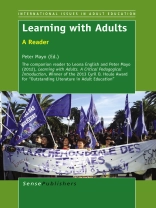This anthology brings together some of the finest writers on different aspects of adult education and related areas to provide a complementary reader to the introductory text by Leona English and Peter Mayo Learning with Adults: A Critical Introduction. Areas tackled include Disability, Prisons, Third Age Universities, Lifelong Learning Policy, Learning Society, Poverty, LGBTQ, Sport, Women, Literacy, Transformative Learning, Community Arts, Aesthetics, Consumption, Migration, Libraries, Folk High Schools, Adult Education Policy, Subaltern Southern Social Movements, Social Creation, Community Radio, Social Film. Contexts focused on include Africa, Caribbean, Europe, Latin America, Asia (India), small island states. Over thirty authors involved including Zygmunt Bauman, Rosa Maria Torres, Oskar Negt, Antonia Darder, Jim Elmborg, D. W. Livingstone, Palle Rasmussen, Mae Shaw, Leona English, Asoke Bhattacharya, Cynthia L. Pemberton, Eileen Casey White, Daniel Schugurensky, Dip Kapoor, Peter Rule, John Myers, Joseph Giordmaina, Antonia De Vita, Alexis Kokkos, Marvin Formosa, Carmel Borg, Julia Preece, Patricia Cranton, Lyn Tett, Ali A. Abdi, Anna Maria Piussi, Behrang Foroughi, Taadi Ruth Modipa, Robert Hill, Edward Shiza, Kaela Jubas and Didacus Jules. … Learning with Adults: A Reader constitutes the most valuable practical and theoretical reflection on adult education I have seen in a long time. Nelly P. Stromquist, Professor, International Education Policy, College of Education University of Maryland, College Park … This book provides an opportunity at a very appropriate moment to discuss adult education issues during challenging times. Paula Guimarães, University of Lisbon … Read and savour delights and surprises. Michael Welton, UBC and Athabasca University This book satisfies everything one could desire of a reader on the subject. Kenneth Wain, University of Malta
Содержание
Introduction: The Multivaried Nature of Adult Education Provision and Learning; Part I: Lifelong Learning and the Learning Society; 2. Learning to Walk on Quicksand: Lifelong Learning and Liquid Life; 3. Youth and Adult Education and Lifelong Learning in Latin America and the Caribbean; 4. The Learning Society: Past, Present and Future Views; Part II: Adult Learning, Difference and Identity; 5. “We Must Believe in Ourselves”: Attitudes and Experiences of Adult Learners with Disabilities in Kwazulu-Natal, South Africa; 6. Women, Sport and Adult Education: Shortchanging Women and Girls; 7. Queering the Discourse: International Adult Learning and Education; 8. Migration, Education, Gender; 9. Adult Education and European Identity; 10. Anti-colonial Subaltern Social Movement (SSM) Learning and Development Dispossession in India; Part III: Sites and Instruments of Practice; 11 ICTs and Adult Learning; 12 Radio as Public Pedagogy: A Critical Adult Education of the Airwaves; 13. Adult Education and Film/Television; 14. Literacies, Naratives and Adult Learning in Libraries; 15. Community Development and the Arts: Towards a More Creative Reciprocity; 16. The Use of Aesthetic Experience in Unearthing Critical Thinking; 17. The Folk High School: Denmark’s Contribution to Adult Education; 18. Four Decades of Universities of the Third Age: Past, present, Future; 19. The European Agenda for Education in Prison; Part IV: Learning in Everyday Life 20. Transformative Learning; 21. Adult Literacies; 22. Learning (through) Consumption: Shopping as a Site of Adult Education; 23. Social Creation; Part V: Policy and Regions; 24. Adult Education and Poverty Reduction; 25. Cinderella and the Search for the Missing Shoe: 1990s Latin American Adult Education Policy and Practice; 26. Adult Citizenship Education and Political Engagement in Sub-Saharan Africa: Critical Analysis; 27. Adult Education policy in Micro-States: The Case of the Caribbean; 28. Globalisation, Southern Europe and European Adult Education Policy; Name Index; Subject Index.












